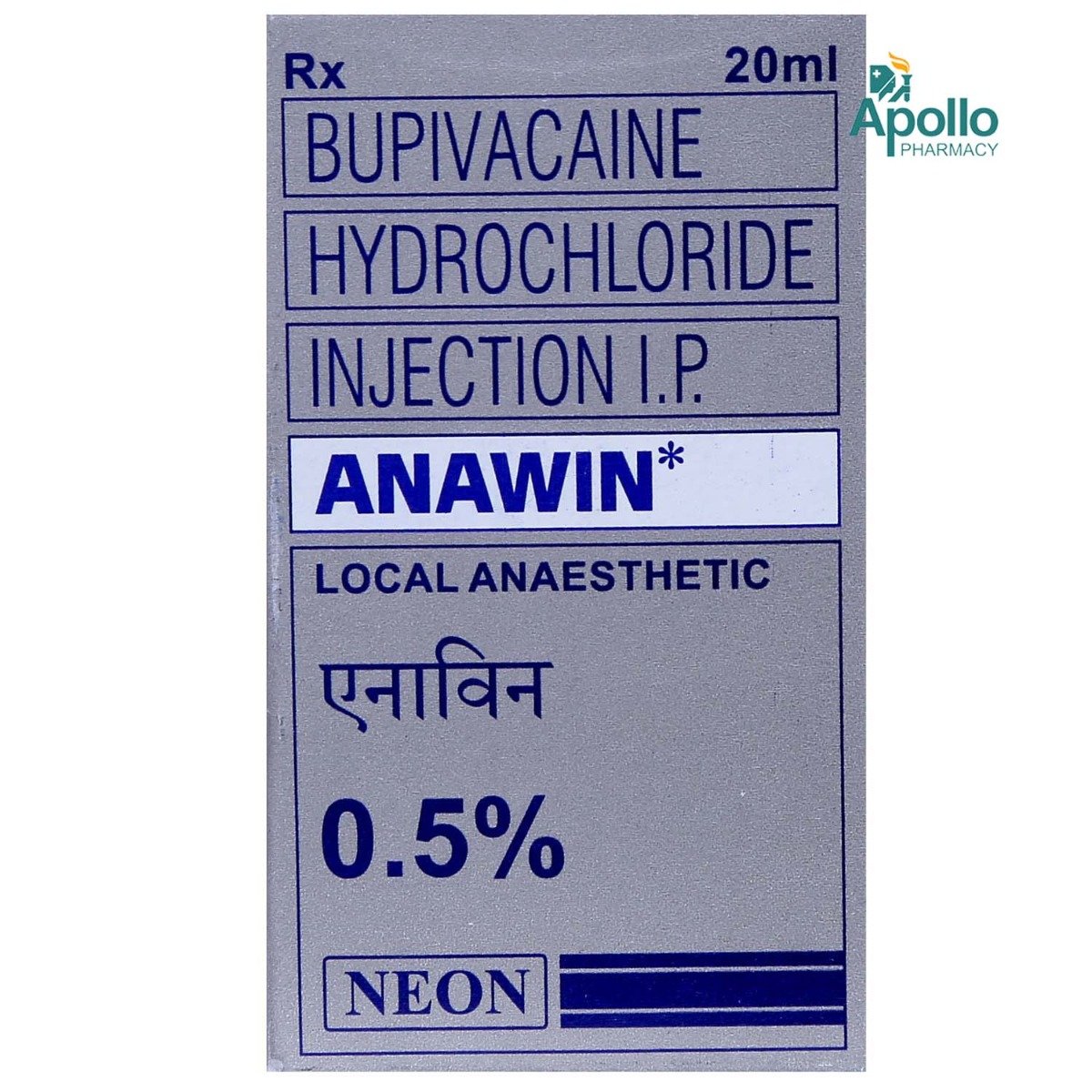Bupivacaine
About Bupivacaine
Bupivacaine belongs to the class of 'local anaesthetics', primarily used to reduce pain and discomfort during labour, surgery, dental treatment and other medical procedures. It produces local numbness and relieves pain. Bupivacaine is given in the form of an epidural injection at the spinal cord to prevent pain during labour and Caesarean section. Pain is a symptom triggered by the nervous system, which causes uncomfortable sensations in the body. Pain may be dull or sharp, and it might be constant or intermittent. The tolerance level of pain might vary from person to person.
Bupivacaine contains 'Bupivacaine' that belongs to the group of medicines called 'amide-type anaesthetics'. Bupivacaine is a numbing medication that blocks the transmission of pain signals in the pain area by acting on the nervous system and nerves. This blockage causes the loss of pain sensation and promotes temperature, touch, deep pressure and muscle control. Thus, Bupivacaine helps in numbing the area and provides relief from pain.
Your doctor will decide the dose and duration based on the severity of your pain and response to treatment. Common side effects of Bupivacaine include weakness, numbness or tingling, restlessness, drowsiness, tremors or shakiness, headache, blurred vision, irregular heartbeat, chills or shivering, back pain, nausea and vomiting. These side effects are not familiar to everyone and vary individually. If you notice any side effects that are not manageable, please consult your doctor.
Inform your doctor if you have liver, kidney or heart diseases, high or low blood pressure, excess fat in the body and breathing problems before starting Bupivacaine. It is essential to let your doctor know if you are pregnant, planning to conceive or a breastfeeding mother before using Bupivacaine. Bupivacaine causes drowsiness, so do not drive until you are mentally alert. Avoid alcohol to further prevent the worsening of side effects like drowsiness. Bupivacaine is not recommended for children less than one year of age.
Uses of Bupivacaine
Medicinal Benefits
Bupivacaine contains 'Bupivacaine,' a local anaesthetic used to relieve pain and discomfort during labour, surgery, dental treatment and other medical procedures. It works by blocking the transmission of pain signals in the pain area by acting on the nervous system and nerves. This blockage causes the loss of pain sensation and promotes temperature, touch, deep pressure and muscle control. Thus, Bupivacaine helps in numbing the localised area and provides relief from pain. Bupivacaine, when injected as an epidural injection at the spinal cord, it prevents pain during labour and Caesarean section.
Directions for Use
- Bupivacaine will be administered by the doctor or nurse in a healthcare setting.
- Do not self-administer it.
Storage
Side Effects of Bupivacaine
- Weakness
- Numbness or tingling
- Restlessness
- Drowsiness
- Tremors or shakiness
- Headache
- Blurred vision
- Irregular heartbeat
- Hypotension
- Chills or shivering
- Back pain
- Nausea
- Vomiting
Drug Warnings
Brief your medical history to the doctor if you have any liver, kidney or heart diseases, high or low blood pressure, excess fat in the body, breathing problems, excess fluid in womb during pregnancy (a condition called hydramnios), a tumour of the ovary, blood poisoning (septicaemia) and fluid around lungs before starting Bupivacaine. Let your doctor know if you use any prescription and non-prescription medications, including vitamins and herbal supplements, before starting Bupivacaine. Bupivacaine may affect the foetus when used by a pregnant mother. It is also released into breast milk during breastfeeding. Please consult your doctor if you are pregnant, planning to conceive or a breastfeeding mother. Bupivacaine causes dizziness and drowsiness, so do not drive until you are mentally alert. Avoid alcohol to prevent the worsening of side effects further. Bupivacaine is not recommended in children younger than one year of age.
Drug Interactions
Drug-Drug Interaction: Bupivacaine may interact with other local anaesthetics (lidocaine), drugs treating abnormal heart rhythms (amiodarone, mexiletine), blood thinners (aspirin), blood pressure-lowering drugs (atenolol, bisoprolol)
Drug-Food Interaction: Avoiding alcohol may improve the side effects of Bupivacaine, like drowsiness and dizziness.
Drug-Disease Interaction: Before using Bupivacaine, let your doctor know if you have any liver, kidney or heart diseases, high or low blood pressure, excess fat in the body, breathing problems, excess fluid in womb during pregnancy (a condition called hydramnios), a tumour of the ovary, blood poisoning (septicaemia) and fluid around lungs.
Drug-Drug Interactions Checker List:
Safety Advice

Alcohol
cautionYou are recommended to limit or avoid alcohol consumption while taking Bupivacaine. Alcohol intake, along with Bupivacaine, may cause increased drowsiness.

Pregnancy
cautionBupivacaine is a pregnancy category C drug. Please consult your doctor before taking Bupivacaine if you are pregnant or planning to conceive.

Breast Feeding
cautionBupivacaine is excreted into the breast milk. Please consult your doctor before taking Bupivacaine if you are a nursing mother.

Driving
unsafeBupivacaine may make you feel dizzy and drowsy that can affect your ability to drive. Do not drive or operate machinery if you experience these side effects.

Liver
cautionPlease consult your doctor since Bupivacaine should be used with caution in patients with liver impairment/liver disease.

Kidney
cautionPlease consult your doctor since Bupivacaine should be used with caution in patients with kidney impairment/kidney disease.

Children
cautionBupivacaine is not recommended in children, unless prescribed by a doctor.
Habit Forming
Diet & Lifestyle Advise
- Maintain a healthy weight by performing regular low-strain exercises and eating healthy food.
- Get adequate sleep, as resting the muscles can help in reducing inflammation and swelling.
- De-stress yourself by meditating, reading books, taking a warm bubble bath or listening to soothing music.
- Eat food rich in antioxidants such as berries, spinach, kidney beans, dark chocolate, etc.
- Foods containing flavonoids help in reducing inflammation. These include soy, berries, broccoli, grapes and green tea.
- Avoid smoking and alcohol consumption.
Special Advise
- Let your doctor know that you are taking Bupivacaine if you are undergoing any medical tests.
- Monitor your blood pressure regularly since Bupivacaine may affect your blood pressure.
Patients Concern
Disease/Condition Glossary
Pain: It is not a disease but a symptom triggered by the nervous system, causing uncomfortable sensations in the body. Pain may be dull or sharp; it might be constant or intermittent. The tolerance level of pain might vary from person to person. Pain can be generalised (overall body aches) or localised (affecting a specific area of the body). Pain can be considered a good thing as it helps us know that something is wrong in the body and thereby helps diagnose the condition. The common causes of pain include headache, muscle strain, cramps, cuts, bone fractures, arthritis and stomach ache.
FAQs
Bupivacaine is used to induce anaesthesia to reduce pain and discomfort during labour, surgery, dental treatment and other medical procedures.
Bupivacaine temporarily blocks the pain signals from the nerves of the painful area to the brain, thereby causing numbness at the affected site and providing relief from pain.
Bupivacaine may affect your blood pressure. It is advised to inform your doctor before using Bupivacaine if you have high blood pressure during pregnancy or low blood pressure.
You are recommended to consult your doctor to know the after-effects of Bupivacaine if you are using an epidural injection of Bupivacaine. Some epidural numbing medications may have long-lasting or permanent effects on body functions like bowel movement or bladder control, sexual function and movement in your legs. Please discuss the risks and benefits thoroughly with your doctor.
After using Bupivacaine, you may not be able to move your body or the localised part for a certain time. You may feel numbness in the injected area. When you are injected with an epidural, you may not be able to move the lower part of your body for a certain period. It is advised to stay careful during such times to avoid any injuries. After a dental procedure with the usage of Bupivacaine, please don't eat, chew gum or drink hot beverages until your mouth is completely free of numbness.
Bupivacaine should be used with caution and only under doctor's supervision if you have any liver, kidney or heart diseases, high or low blood pressure, excess fat in the body, breathing problems, excess fluid in womb during pregnancy (a condition called hydramnios), a tumour of the ovary, blood poisoning (septicaemia) and fluid around lungs. Please let your doctor know if you suffer from any medical issues before using Bupivacaine.
The common side effects of the Bupivacaine may include weakness, numbness or tingling, restlessness, drowsiness, tremors or shakiness, headache, blurred vision, chills or shivering, back pain, nausea, and vomiting. However, these symptoms vanish as your body adjusts to the medication. If these symptoms become worse, please consult a doctor for relief.
Bupivacaine contains Bupivacaine, which belongs to the group of medicines called amide-type anesthetics.
Pregnancy Category C means that animal studies have shown potential risks, but there are no good studies in pregnant women. As a result, the medication should only be used during pregnancy if the potential benefits justify the possible risks. Always consult your healthcare provider for personalized guidance.
Bupivacaine is not an opioid or narcotic. It belongs to the class of local anesthetics. It primarily reduces pain and discomfort during surgery, dental treatments, and other medical procedures.
Bupivacaine is a local anesthetic for numbing a specific area during surgeries or medical procedures. Depending on your condition, pain extent, and overall health, your doctor may combine it with other medications for optimal pain relief. Following your doctor's advice is best to avoid any potential interactions.
Both Ropivacaine and Bupivacaine are safe and effective local anesthetics. Your doctor will prescribe the one most suitable for you based on your health status and the severity of your condition.
Early signs of local anesthesia toxicity can include symptoms like perioral numbness (numbness around the mouth), tinnitus (ringing in the ears), agitation, difficulty speaking (dysarthria), and confusion. These may be followed by more severe central nervous system (CNS) derangements such as seizures and coma.







